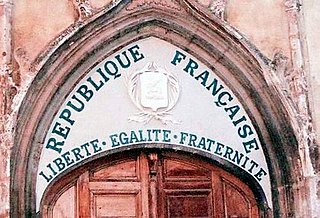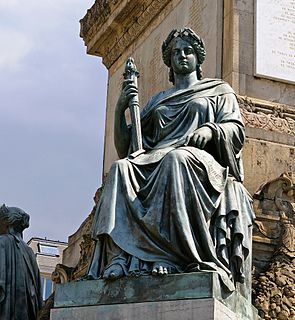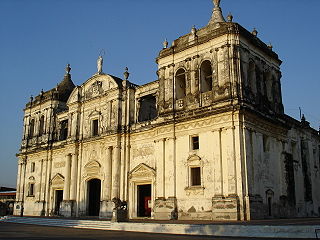
The Anti-Revolutionary Party was a Protestant conservative and Christian democratic political party in the Netherlands. The party was founded in 1879 by Abraham Kuyper, a neo-Calvinist theologian and minister. In 1980 the party merged with the Catholic People's Party (KVP) and the Christian Historical Union (CHU) to form the Christian Democratic Appeal (CDA).
The separation of church and state is a philosophic and jurisprudential concept for defining political distance in the relationship between religious organizations and the state. Conceptually, the term refers to the creation of a secular state and to disestablishment, the changing of an existing, formal relationship between the church and the state. Although the concept is older, the exact phrase "separation of church and state" is derived from "wall of separation between church and state", a term coined by Thomas Jefferson.
In secular usage, religious education is the teaching of a particular religion and its varied aspects: its beliefs, doctrines, rituals, customs, rites, and personal roles. In Western and secular culture, religious education implies a type of education which is largely separate from academia, and which (generally) regards religious belief as a fundamental tenet and operating modality, as well as a prerequisite for attendance.

Secularism is a constitutional principle of France. Article 1 of the French Constitution is commonly interpreted as discouraging religious involvement in government affairs, especially religious influence in the determination of state policies; it also forbids government involvement in religious affairs, and especially prohibits government influence in the determination of religion. Secularism in France does not preclude a right to the free exercise of religion.
Religious discrimination is treating a person or group differently because of the particular beliefs which they hold about a religion. This includes instances when adherents of different religions, denominations or non-religions are treated unequally due to their particular beliefs, either before the law or in institutional settings, such as employment or housing.
In Canada, a separate school is a type of school that has constitutional status in three provinces and statutory status in the three territories. In these Canadian jurisdictions, a separate school is one operated by a civil authority—a separate school board—with a mandate enshrined in the Canadian Constitution or in federal statutes. In these six jurisdictions a civil electorate, composed of the members of the minority faith, elects separate school trustees according to the province's or territory's local authorities election legislation. These trustees are legally accountable to their electorate and to the provincial or territorial government. No church has a constitutional, legal, or proprietary interest in a separate school.
"Separation of church and state" is a legal principle in the United States, which is related to, but not found within, the First Amendment to the United States Constitution, in the Bill of Rights. The First Amendment reads: "Congress shall make no law respecting an establishment of religion, or prohibiting the free exercise thereof..."
Liberalism in the Netherlands started as an anti-monarchical effort spearheaded by the Dutch statesman Thorbecke, who almost single-handedly wrote the 1848 Constitution of the Netherlands that turned the country into a constitutional monarchy.
In the Dutch education system, particular education refers to a separate category of education distinct from both public and private education, in which a school is administered by an independent board, as opposed to a government authority, while still receiving government funding. Particular schools are comparable to the concept of a charter school, with the additional characteristic of being grounded in a particular religious denomination or educational philosophy. Particular education is not to be confused with "speciaal onderwijs", which refers to schools specialized to deal with physical and/or learning disabilities.
Freedom of religion in Italy is guaranteed under the 1947 constitution of the Italian Republic. Before that religious toleration was provided for by the constitution of the Kingdom of Italy which in turn derived from the Albertine Statute granted by Carlo Alberto of the Kingdom of Sardinia to his subjects in 1848, the Year of Revolutions.

The General League of Roman Catholic Riding Associations, informally called the General League, was a Catholic political party in the Netherlands. It is one of the ancestors of the Christian Democratic Appeal, currently a major party in the Netherlands.

Freedom of education is the right for parents to have their children educated in accordance with their religious and other views, allowing groups to be able to educate children without being impeded by the nation state.

In the United States, freedom of religion is a constitutionally protected right provided in the religion clauses of the First Amendment. Freedom of religion is also closely associated with separation of church and state, a concept advocated by Colonial founders such as Dr. John Clarke, Roger Williams, William Penn and later Founding Fathers such as James Madison and Thomas Jefferson.

Religion in Nicaragua is predominantly Christian and forms a significant part of the culture of the country as well as its constitution. Religious freedom and religious tolerance is promoted by both the Nicaraguan government and the constitution.

This article gives an overview of Christian democracy in the Netherlands, which is also called confessionalism, including political Catholicism and Protestantism. It is limited to Christian democratic parties with substantial support, mainly proved by having had a representation in parliament. The sign ⇒ means a reference to another party in that scheme.

The Pacification of 1917 was a political agreement between liberals and socialists on the left and Christian democrats on the right in the Netherlands, ending both the suffrage issue and the school struggle.
The Constitution provides for freedom of religion, and the Government generally respected this right in practice for all but a minority of religious groups. Government policy continued to contribute to the free practice of religion for all but those religions termed "sects." There was a report of an anti-Semitic physical attack against a person and a violent anti-Semitic attack against property. Other anti-Semitic incidents occurred during the year. There was some societal mistrust and discrimination against members of some non-recognized religious groups, particularly those referred to as "sects." During 2006 there were 32 cases of discrimination based on religion brought before the Equal Rights Commissioner. Muslims also reported prejudice, particularly with regard to headscarves and Muslim cemeteries.

Johan Rudolph Thorbecke was a Dutch liberal statesman, one of the most important Dutch politicians of the 19th century. In 1848, he virtually single-handedly drafted the revision of the Constitution of the Netherlands, giving less power to the king and more to the States General, and guaranteeing more religious, personal and political freedom to the people.

The Constitutional Reform of 1848 laid the basis for the present system of parliamentary democracy in the Netherlands. It is often described as the original version of the Dutch Constitution that is still in force today. Under pressure from the Revolutions of 1848 in surrounding countries, King William II agreed to several demands of the liberal parliamentary opposition. The House of Representatives obtained much more influence, and was now directly elected. The reform was in some sense a peaceful revolution, in which liberal politician Johan Rudolph Thorbecke and King William II played important roles.
The status of religious freedom in Africa varies from country to country. States can differ based on whether or not they guarantee equal treatment under law for followers of different religions, whether they establish a state religion, the extent to which religious organizations operating within the country are policed, and the extent to which religious law is used as a basis for the country's legal code.









